St David's Day: A Welsh enclave in America celebrates
- Published
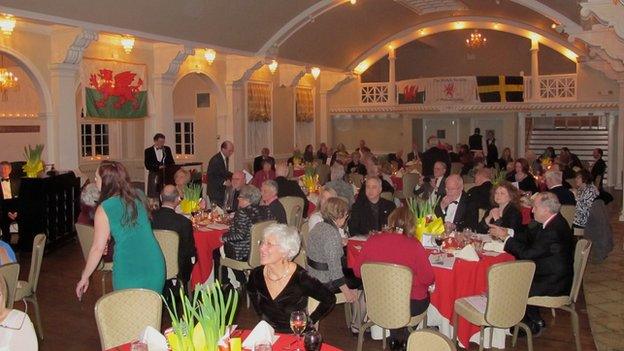
Every year the group holds a well-attended St David's Day banquet
St David's Day largely goes unnoticed across the US, but one community does its upmost to commemorate the most important event in Wales' calendar. Ross Davies heads over to Pennsylvania to investigate.
Donald Jones Marcus, of Newtown Square, Pennsylvania, is asking how I am from the driver's seat of his vehicle.
"Sut dach chi?" he enquires.
It's not the kind of question - or, indeed, language - one would ordinarily expect to hear in the northern suburbs of Philadelphia.
His amiable interrogation continues, as he navigates down an icy, tree-lined byroad.
"Ydych chi'n siarad Cymraeg?"
Marcus is speaking Welsh. Lilting, but guttural on the right consonants, it recalls the kind of intonation found in the taverns of my parents' native Dyfed in south Wales.
And he isn't the only Pennsylvanian to speak what is commonly considered to be one of Europe's oldest languages.
Moments later, having arrived at our destination, Bill Lewis issues an almost identical greeting.
"Sut dach chi?"
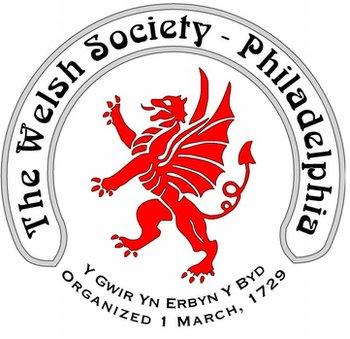
Both men belong to the Welsh Society of Philadelphia, external, which dates back to 1729 and claims to be "the oldest ethnic society in the United States".
Soon after entering the spacious home of past-president David Bevan - doubling up as the society's headquarters for the evening - I am struck by other cultural signifiers, more in keeping with Penarth than Pennsylvania.
Clayton Ames, chaplain of the society, and rugby fanatic, is keen to discuss Wales' impending Six Nations fixture against England (which Wales went on to lose 16-21).
Resident musician Jack Williams reminisces over last year's Cymanfa Ganu, an annual festival of Welsh sacred hymns.
Similarly, Wynrhys Coughlan and David Walker Jr - who has brought over a fresh batch of homemade Welsh cakes - wax lyrical on the secret behind a good tesien lap, external.
Amid the chatter, Bill Lewis is quick to emphasise that members of the society - which total close to 300 - are immensely proud of their Cambrian roots, despite some never having been to the old country.
"We have really tried to stay true to the culture of our ancestors," he explains. "Even though I was born here, I've always identified myself as Welsh, as opposed to Welsh-American. Having a Welsh wife also helped!"

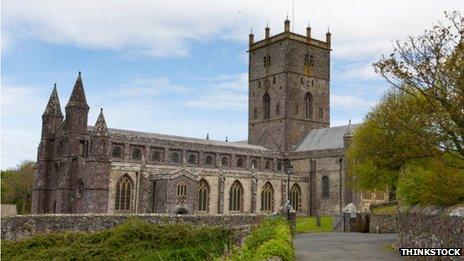
St David's cathedral in Wales
Who was St David?
St David is the patron saint of Wales, whose saint's day is celebrated annually on 1 March.
St David (or Dewi Sant in Welsh) was born on the south west coast of Wales, near the present day city of St Davids.
His family was aristocratic. He was educated at a monastery and became a missionary, travelling through Wales and to south west England and Brittany to spread Christianity. He is also supposed to have visited Rome and Jerusalem.
David founded a monastery where St Davids stands today. He died in AD589 and was buried in the grounds of his own monastery. He has been the patron saint of Wales since the 12th century.
From BBC History

Many of the Society's members can trace their lineage back to the late 1600s, when the first Welsh settlers arrived in Pennsylvania with the hope of establishing a self-governing Welsh Tract.
Attracted by its burgeoning coal industry, a steady influx of immigrants continued to make their way over the Atlantic well into the early 20th Century.
Several town names - christened after places in Wales - still bear witness to that period, such as Bryn Mawr, Tredyffrin, Bala Cynwyd, Radnor and, of course, St Davids.
The society was originally set up as a philanthropic organisation to help newly landed Welsh immigrants - often impoverished and infirm - acclimatise to life in the US.
"Back in the 1700s and 1800s, we nursed you back to health, helped you find work and gave legal representation," says Mr Williams. "We even built a cemetery for those Welshmen and women who died not long after arriving here."
The conceit of benevolence on which the society was built seems to have held fast. Today, it awards scholarships to higher-education students of documented Welsh descent based within 150 miles of Philadelphia.
Yet, beyond these four walls, one could be forgiven for thinking that the Welsh Society of Philadelphia - or Wales, for that matter - was a clandestine group.
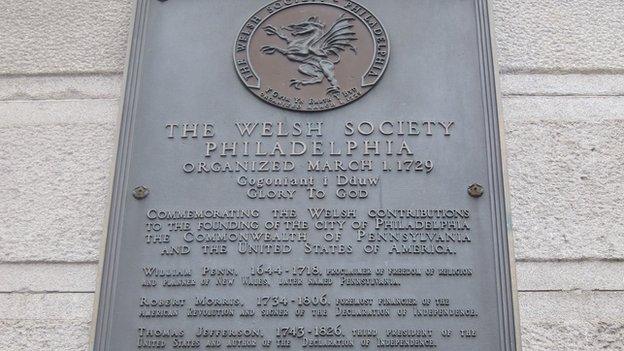
A plaque on City Hall recognises notable Welsh Americans
Earlier in the day, I had asked my hotel receptionist on what he knew of Cymru, external.
"I know that it's there, but that's about it," he replied.
It's hardly surprising that Welshness might be seen as curious in contrast to, say, America's prominent Irish population, which is over 10 times' bigger.
"You could perhaps say that we've been far too modest as a community," answers Clayton Ames.
"There's a certain inferiority complex still associated with the Welsh," Mr Lewis says, and notes that keeping the Welsh language alive is a priority.
"When I was a boy, I was lucky to hear Welsh spoken all the time, and I tried to pass that down to my daughter. As it happens, my three-year-old granddaughter is learning, and already has quite a vocabulary. She refers to me as tad-cu, external."
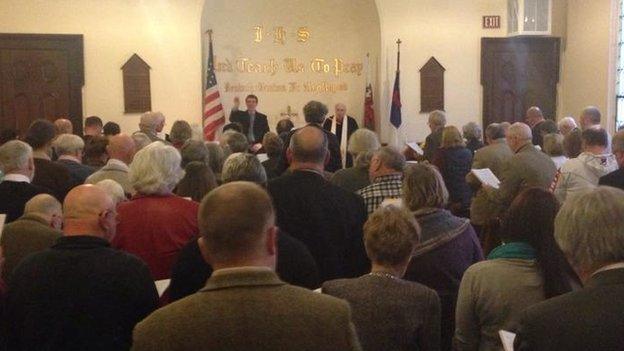
Members of the Welsh Society of Philadelphia at Cymanfa Ganu
In addition to its annual St David's Day banquet, the Society has also diversified its activities in a bid to better engage with the old country: a partnership with the National Library of Wales and plans to schedule a trip to Wales in the next year.
The evening draws to close with a sing-along around Mr Williams on the piano. Traditional hymns Calon Lan and Cwm Rhondda - long appropriated by rugby fans - are sung with joy and gusto by all.
They are then followed by the national anthem, Hen Wlad Fy Nhadau (Land of My Fathers), bellowed word-perfect and with palpable pride.
For a moment, I think to myself, I could be back in Wales.